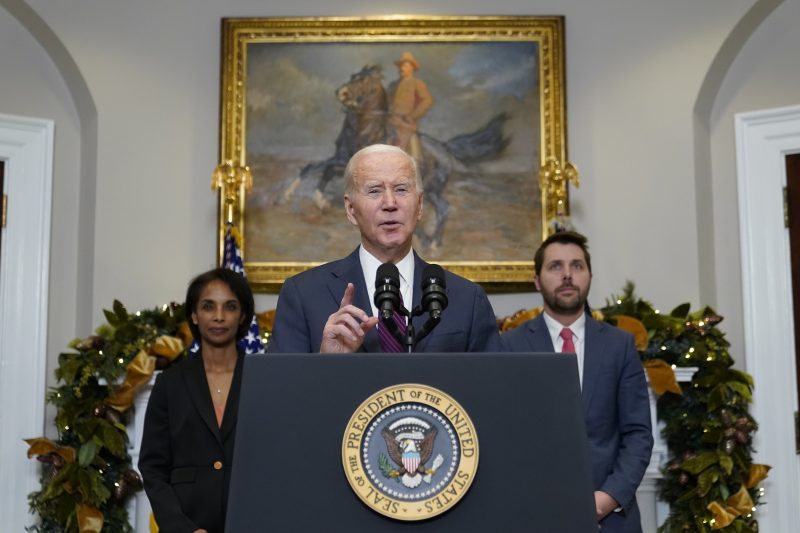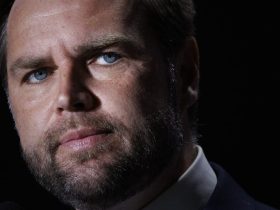President Biden on Tuesday sought to capitalize on positive economic news that inflation numbers are cooling, arguing that his policies are helping stabilize an economy battered by a global pandemic and a war in Ukraine, after months of facing political ridicule for rising prices.
“Inflation is coming down in America,” Biden said, declaring it a reason for optimism ahead of the holiday season and the year ahead.
His remarks came after more than a year when Republicans charged that Biden’s free-spending policies helped generate the conditions for near record-high inflation, and then downplayed the effect on Americans by calling the problem “transitory.”
Rising gas prices and food costs, combined with warnings of a recession on the horizon, created a noxious political picture for Democrats ahead of the midterm elections. But the party emerged stronger than anticipated, and Biden is now seeking to reframe the economic narrative ahead of announcing his own reelection plans early next year.
“Look, I know it’s been a rough few years for hard-working Americans and for small business as well — and for a lot of folks things are still pretty rough,” he said in remarks from the Roosevelt Room at the White House, flanked by top economic advisers. “But there are bright spots all across America. We’re beginning to see the impact of our economic strategy. And we’re just getting started.”
Biden seized on new metrics as he began shaping what could be a message for his 2024 campaign if he runs as expected, or for his legacy if he steps aside.
Biden spoke a little over an hour after new figures were released by the Bureau of Labor Statistics showing that prices in November rose 7.1 percent compared to 2021, the smallest year-over-year increase in many months. A number of other figures — including “core inflation,” which removes volatile categories like food and energy prices — also showed smaller increases.
There is still cause for concern. The figures often ebb and flow, and economists prefer to see several months’ worth of numbers before drawing conclusions. Biden, perhaps aware of a potential backlash if he appears to be celebrating prematurely, stressed that he was not declaring mission accomplished.
“As we make the transition to a more stable growth, we could see setbacks along the way as well,” he said. “We shouldn’t take anything for granted.” He added that there is “a lot more work to do.”
Republicans were quick to note that even if prices are rising more slowly, they are still high by historic standards.
“So much for President Biden’s claim that inflation peaked one year ago — grocery prices rose by 12 percent over the last year,” Rep. Kevin Brady (R-Tex.), the top Republican on the tax-writing House Ways and Means Committee.
“American families are maxing out credit cards, while household wealth has declined for the third consecutive quarter,” Brady said. “This cruel economy is going to get a lot worse next year, once President Biden’s tax increases go into effect.”
But there is little doubt conditions have improved, for the moment at least. Gas prices, which the White House monitors religiously as a barometer of consumer sentiment, are lower than they were a year ago, selling at less than $3 in many places. In June, the average price of gas surged to $5 a gallon.
In Biden’s first two years, he steered several major bills through Congress, starting with a $1.9 trillion economic rescue package and a $1.2 trillion bipartisan infrastructure law. Congress in August also approved a $280 billion measure to expand veterans health care and a $280 billion law to counter China’s economic rise.
One of his signature pieces of legislation this year was labeled the Inflation Reduction Act, even though it had more to do with funding efforts to combat climate change, raising taxes on large corporations and lowering health care costs.
Conservatives argued that all this spending was paving the way for runaway inflation, even as Biden said it was critical to provide relief to suffering Americans. And some prominent Democrats, including former Treasury Secretary Larry Summers, agreed with the conservatives.
On Tuesday, Summers applauded the latest numbers, saying, “The figures are encouraging.” He said he still believes that inflation has its roots in the overstimulation of the economy during 2021, when the Biden administration injected large amounts of spending.
But Biden’s decision to release more from the Strategic Petroleum Reserve has helped reduce gas prices, Summers said, and some of the coming investments in semiconductors and infrastructure could spur further economic growth. He also attributed the improving economic outlook to moves by the Federal Reserve to combat inflation, and to the White House policy of not meddling in those decisions.
“These data are encouraging, even as the president recognizes we have a long way to go,” Summers said. “But for the administration’s support for the independence of the Fed as it adjusted policies — and the aggressive use of the strategic petroleum reserve — we could well have been in a much more difficult place today.”
Earlier this year, the Post has previously reported, Biden grumbled to top White House officials about his own aides’ handling of inflation. He expressed particular frustration in the early months of the year that they were not doing enough to confront the problem more directly.
The White House worried for much of the year that the persistent inflation would eclipse Biden’s agenda, clouding his ability to sell his accomplishments to voters in the lead-up to the midterm elections.
A Washington Post-ABC News poll in early May found that more than 9 in 10 Americans were concerned about the rate of inflation, and nearly 7 out of 10 said they disapproved of Biden’s handling of it.
Celinda Lake, a Democratic pollster and strategist, conducted focus groups throughout the midterm campaign seeking to gauge how voters were viewing the economy. One woman, she recalled, mentioned that “everything seems to be a dumpster fire” and was eager for some sense of stability.
Lake said that Democrats’ relatively strong performance in the midterms, even as they lost control of the House, reflected a rebuke of Republicans’ polarizing, sometimes anti-democratic message rather than support for Biden’s economic policies.
Still, she said, the slowdown in inflation could be a promising sign for the president and his party.
“Democrats and Biden were 20 points behind on the economy on election day,” Lake said. “I don’t know that Democrats won because of the economy so much as despite the economy. But the persistence of the administration, and the focus and constant work to improve, is finally breaking through, both in results and in perception.”
Biden’s economic policies have largely focused on expanding access to health care, attempting to impose higher taxes on the wealthiest Americans and corporations and revive domestic industries.
The White House has long argued that the covid-19 rescue plan, one of Biden’s first big legislative victories, provided a necessary infusion of funds to stabilize the job market and help small businesses at a time when they were struggling under the weight of the pandemic.
Biden on Tuesday noted that wages are now rising faster than the prices of many goods, and he suggested that the United States was doing far better than its global allies and competitors.
“In a world where inflation is rising in double digits in many major economies around the world, inflation is coming down in America,” he said. “Our economic plan is working.”
Biden specifically cited the price of televisions and toys that could be purchased as gifts, the cost of gas that families need to travel and the price of food that extended families will serve at gatherings.
“It’s good news for the holiday season,” he said more than once.
But asked when prices will get back to normal, the president hesitated.
“I hope by the end of next year, we’re much closer. But I can’t make that prediction,” he said. “I’m convinced they’re not going to go up. I’m convinced they’re going to continue to go down.”
While Biden pointed to the latest figures as reason to spread the good cheer, Rep. Jason Smith (R-Mo.), the top Republican on the House Budget Committee, said this was no time to celebrate.
“Thanks to the spike in prices brought on by the Biden administration and Congressional Democrats’ reckless spending,” he said in a statement, “Americans are bracing for a blue Christmas.”








